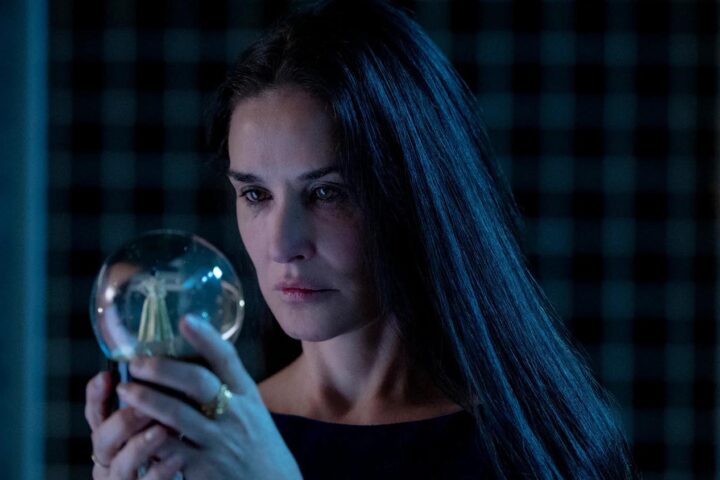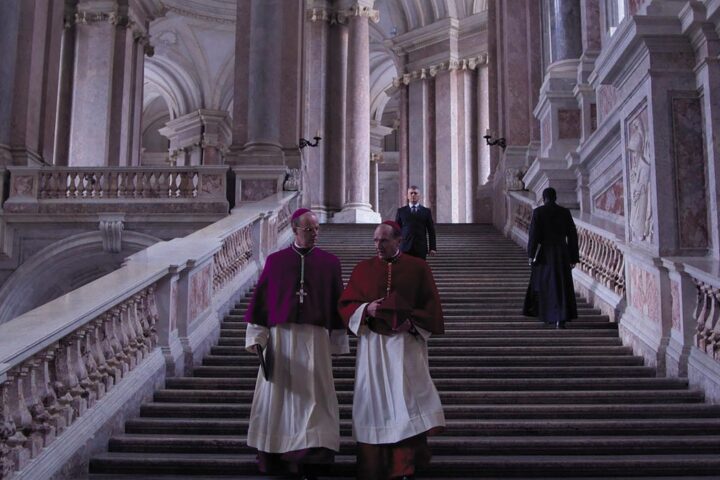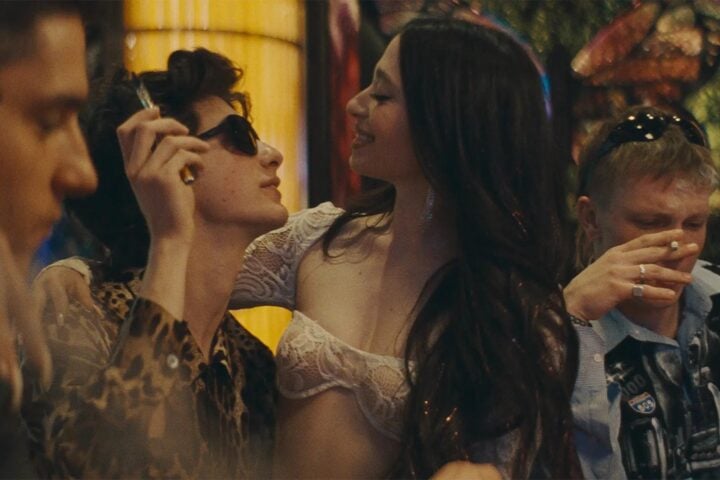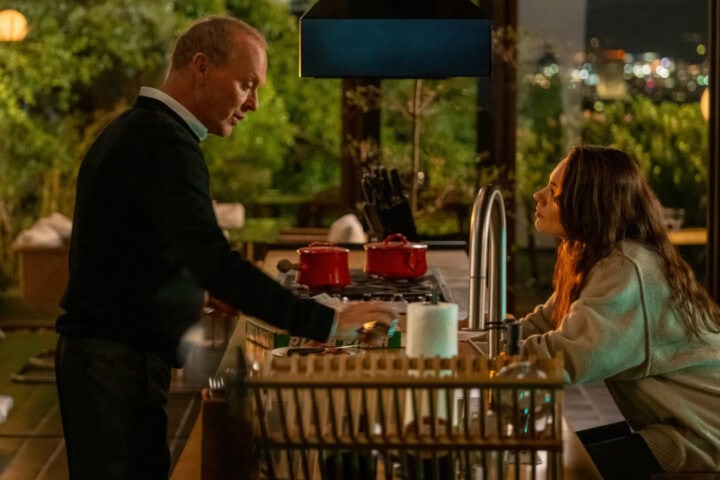If there’s a thematic thread that ties the plots of Sean Baker’s films together, it’s that much of their wildest narrative developments might be avoidable in a country with a less uptight attitude toward sexuality than America. Since first exploring the world of sex work with his 2012 independent breakout Starlet, the writer-director’s filmmaking interests have never strayed too far from the industry. While the tone of his stories range from madcap comedy (2015’s Tangerine), to wrenching social realism (2017’s The Florida Project), to provocative character study (2021’s Red Rocket), the colorful craziness undergirding all of them stems from a deeply American aversion to the world’s oldest profession.
Baker’s Palme d’Or-winning Anora synthesizes over a decade of work into a single feature. This exhaustive exploration of the promises and pratfalls of a sex worker’s life begins as a fairy-tale romance for Mikey Madison’s eponymous character (who prefers the Americanized name Ani). On a fateful evening in her workplace, she captures the fancy of Mark Eydelshteyn’s Ivan, the pampered young son of a Russian oligarch. At a pace rivaling her own speed in sizing up a client, the tenacious Brooklynite performer finds herself increasingly enmeshed in Ivan’s opulent orbit.
Though their whirlwind romance results in an impromptu Vegas wedding, tying the knot isn’t merely the culmination of their blossoming connection. Instead, it’s the commencement of Ani’s initiation into the harsh realities of wealth and privilege. The sugar rush of initial attraction, which developed largely in a vacuum, crashes quickly upon the revelation of their nuptials.
All bets are off following the film’s centerpiece, a home invasion triggered by Ivan’s parents sending a crew of Armenian henchmen to help arrange an annulment. This real-time sequence that plays out over 28 minutes resets the stakes for Anora and enables it to access the full rollercoaster of tonalities from Baker’s earlier work. As Baker toggles seamlessly between a zany chase to locate Ivan as he flees accountability and a sober-minded assessment of Ani’s class position, the film remains grounded thanks to Madison’s committed performance.
I spoke with Baker and Madison in the middle of their whirlwind festival tour prior to Anora’s theatrical release. Our conversation covered how they collaborated to create Ani, what their extensive research added to the authenticity of the film’s on-screen world, and where youth and love play a role in shaping the character’s trajectory.
Given that the main character’s profession involves performance so deeply, how were you all thinking about the divide between Ani and Anora? Is there a “real” version of her underneath all the appearances you held true?
Mikey Madison: We get to see Ani at so many different places in her life. We get to see what she’s like at work, which is obviously a version of her that she’s presenting to her clients. Then, there’s also a different version of her that we get to see when she’s in more of a private environment with her sister. But I think that we all do that. We all have different versions of ourselves that we present to other people. I think that’s very human.
Sean Baker: Just her line of work requires her to be performing nightly. Every time there’s a different interaction with a client, there’s a form of performance. We tried to really show that in the first few minutes of the film where we were setting up the mechanics of the club and showing a night in the life of Ani. Mikey had done so much research; [she] shadowed dancers and spent time at that club. I asked her to improvise that stuff, and it was wonderful to see Mikey take that on and see that performance of what Ani has to do when she’s approaching a client or having a client approach her. She has to read that client in a couple of seconds and figure out how she’s going to mold her performance in that moment for that particular client. This is something we were definitely trying to explore. It’s a big part of Ani as a character.
Mikey, were you thinking about the character at all in terms of the relation to your own profession as an actor? In both, the ability to sustain oneself is tied to this ability to sell a false reality and get people to buy in.
MM: I don’t think I ever thought about it like that, but I do feel that my background as an actor was helpful in terms of the improvisation. To be a dancer, you have to be a very intuitive person. You have to be able to read people very quickly, like Sean was saying, and immediately try to understand what they want, what you can offer them, and what kind of conversation is enticing to them. My background, with the acting training that I’ve had, was only beneficial to that.
The voice was a key first step for embodying Ani physically. Did that exploration also provide a thematic grounding at all in how she’s relating to her past and heritage? I have some distant family from areas near Russia, and they thought similarly about language and accent being something you leave behind in America.
MM: I think that’s one of my biggest jobs as an actor: to know exactly who she is, what her life is, and what her life has been like. So when I was preparing the character, I sat down at my computer and asked myself 200 or so questions about who she is. You fill it out from there, and I think that’s really the only way that you can play a character who’s so different from you. I don’t want to leave any question unanswered or stone unturned about who she is so that, when I’m on set, I’m easily able to embody her. They could have asked me where my character went to middle school, and I would have had some kind of answer. It’s important to do that.
SB: That’s the first time I’m hearing about that! I didn’t know Mikey had 200 questions, that’s very cool. I also want to add that with Ani and her line of work, she has to have this pseudonym for privacy and safety purposes. But I also think there’s another thing going on there that speaks to what you just asked. I have a lot of friends who are first-generation [American], and sometimes their parents or their grandparents are so ingrained with the culture of wherever they came from. There’s an active undertaking to remove herself from there. That’s why she uses an American name instead of Anora. She intentionally doesn’t speak much Russian. She doesn’t even like to unless she has to. So there’s that sort of separation from her culture [that’s happening] on purpose because she considers herself an American.
MM: And that was something that I thought about a lot when preparing. The dialect, obviously, is very specific to Brighton Beach and the way that girls talk at clubs. There’s a certain cadence to that. But also the way that I spoke Russian, I wanted to be very clear in what that would sound like. It’s not supposed to be perfect. She’s supposed to have a certain level of where her Russian is at. That was a language that I didn’t know at all, so it was almost a blessing, in a way. But, at the same time, I had to keep in mind where she was and what exactly it would sound like.
You both did a lot of research and consultation with sex workers, which informed the active definition of who Ani is. Was there also any measure of trying to counteract any common narratives about sex workers and the industry at large?
SB: It was just about approaching the character in a way that would be as uncaricatured as possible. And I think that that comes a lot from our wonderful consultants, such as Andrea Werhun, where we asked for little details that you would only know if you came from the world of sex work. I think that stuff builds and builds. Sometimes, we have slang that we don’t define to the audience. If they want to Google it later, they can. The reference when Diamond [played by Lindsey Normington] says, “Oh, you caught your whale,” that’s a term that’s used within that world. It was just about doing everything we can do that so that Annie isn’t a caricature.
MM: I was really dedicated to making her as honest and realistic of a person as possible. That’s why I spent so much time fleshing out so much about her backstory, who she is, and wanting to be really specific about everything that makes up her life. From there, you’re able to build an honest person from the ground up. It can’t be a caricature if you do all that work.
Sean, as a cinephile, were you thinking about Anora in conversation with depictions of sex workers on screen? You’ve mentioned Nights of Cabiria as an inspiration, but it also feels very in the spirit of Lizzie Borden’s Working Girls by showing how these are just workers in the economy like anybody else.
SB: I love Lizzie Borden! Yes, there are iconic films—unfortunately, few and far between. But that one, Nights of Cabiria, Adua and Her Friends, the films of Imamura [Shōhei] and Suzuki [Seijun] that were empathetic approaches to the subject matter, I was definitely in tune with them. Those films, in many ways, set the path for this film and showed me the way.
It comes out the most in the scenes that Ani shares with Ivan, but how central is Ani’s youth to the fairy-tale aspects of the film and the grittier economic tale? Is she just learning the same lessons as anybody else in their early 20s might be?
SB: I know my answer—Mikey, do you want to go first?
MM: Of course, your early 20s are such a transformative time in your life, but I do think that Ani is very sure of her place in the world. I think that she knows who she is. It’s just other people who aren’t able to catch up to that or question it.
SB: She’s most definitely independent, street-smart, and way more mature than other people of her age. But she’s still 23 and youthful. There’s one little line of improv in the proposal scene in Vegas when we’re dollying around the bed. Ivan says, “I’m going to have to go back to Russia and work for my father,” and Ani says, “Oh, that’s why you’ve been splashing out.” He says, “No, I just party all the time.” And this is where Mikey added in: “Ah, I love it.” And it’s sincere! I can see Ani actually does like that. She finds that his life seems, in many ways, problem-less and without any troubles. It’s appealing to her. She’s a hard worker, but to see that this kid can basically do whatever he wants, party all the time, and have fun, I think that’s appealing to someone who’s 23 and going through the grind already as a grown adult. So there’s a little bit of both there. That’s what’s so wonderful about Mikey’s performance. There’s that nuance there.
How do you both see Ani’s, and the film’s, relationship to love? Is it real? An illusion? A capitalist construction?
MM: Is Ani really in love with Ivan? Are they in love with each other? Or is Ani in love with the idea of what [love] could be? Is she in love with his lifestyle and the fairy tale that’s been presented to her? Those were questions that I had in my mind while we were making the film.
SB: We talked a lot about this. I remember Mikey and I discussed that maybe Ani isn’t fully in love with Ivan when they get married, but she can fall in love with him. She sees the potential of a real future and believes in it. It’s real. Of course, there’s this enticing lifestyle, but I also really do believe that Ani does believe in love and is looking for it like every other human being.
I thought about this potential a lot in the scene where she’s teaching Ivan to slow down during sex. There’s no incentive for her to prolong it, and it does genuinely show some sense of caring.
SB: There, I see it. We designed all of that to be left up for interpretation. Anybody can have their own take on it. But I personally see Ani as falling for Ivan. I don’t know about you, Mikey.
MM: Degrees of it, yeah.
There are so many small moments where Ani feels class solidarity with people like the cleaning staff or the gas station attendant with just a quick look. Were those things scripted as such or moments you found along the way?
SB: They were scripted. We even had one with a flight attendant that we cut out. She’s saying goodbye to one world, in a way. We do these cuts often where it’s showing the parallels between her line of work and other lines of work that we’re maybe more familiar with and consider menial to show that this work is just as hard…and, sometimes, maybe just as menial. We do that hard cut between the help cleaning up the day after the New Year’s Eve party right to her on the pole, and that’s an intentional cut there.
Sean, on the set of your earlier and even scrappier films, you couldn’t necessarily take over the entirety of a business you were shooting in. By letting the real operations interfere with the shoot, that breathed in some authenticity. Were you buying out sets this time?
SB: Yeah, we had to buy the club! That was necessary for those scenes. But we did something similar with Tatiana’s. That was a time when we had worked things out with the owners and had permission to shoot there, but it was a normal night in which there was a real party happening and real patrons. We just crashed it! [laughs] That was quite intentional. What we try to do on my productions is control like 90% but leave 10% up to chance, happenstance, serendipity, and the film gods giving us stuff. We intentionally put ourselves in situations that will allow for that.
You’re still achieving a similar result where it feels like the world is going on around the action, so how do you make it feel alive?
SB: Well, thank you, that’s nice to hear! That was important for us, especially in the first five minutes of the film. I wanted to show the mechanics of the club and a night in the life of Ani. Because we knew we weren’t shooting in an actual active club, we did our best to make it up and running. We had everyone interacting at a normal volume level. We had our producer actually DJing music and blasting it so that Mikey had to project her voice over the music. That felt very real and in the moment. The way we shot was very docu, either through a telephoto lens or hand-holding as we followed Mikey around. She actually had an earpiece, and I was able to communicate with her. I would say, “Go over to the gentleman to your right,” and she would go over and have an interaction with someone she’d never met before. A complete stranger. So there was hybrid stuff going on there—that gray area between narrative fiction and docu.
MM: It’s so easy to be immersed in that club environment because of the way that we shot it. Obviously, like Sean said, the music’s blasting. My co-workers are all over the place having conversations with people and giving dances. There are men looking for time to spend together. It was really exciting as an actor to have that kind of experience where you’re able to enter situations and have no idea where the conversation is going to take you. I really relied on all of my preparation and research that I had done to get me to those conversations and bring me to the places I needed to be. But it was really fun to film those scenes!
Since 2001, we've brought you uncompromising, candid takes on the world of film, music, television, video games, theater, and more. Independently owned and operated publications like Slant have been hit hard in recent years, but we’re committed to keeping our content free and accessible—meaning no paywalls or fees.
If you like what we do, please consider subscribing to our Patreon or making a donation.






